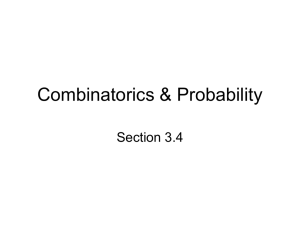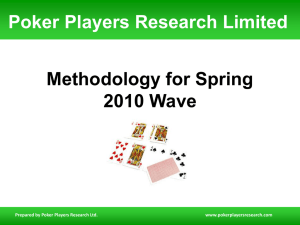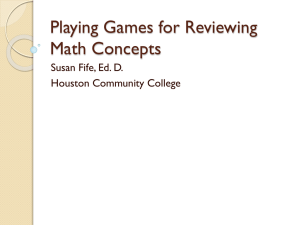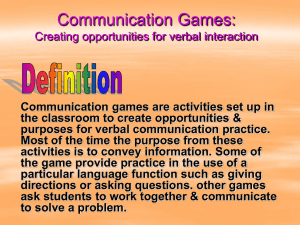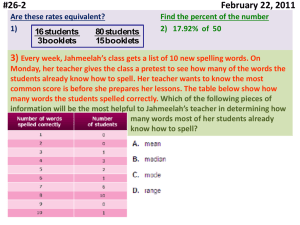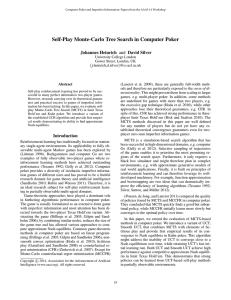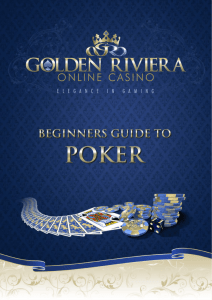PowerPoint
advertisement
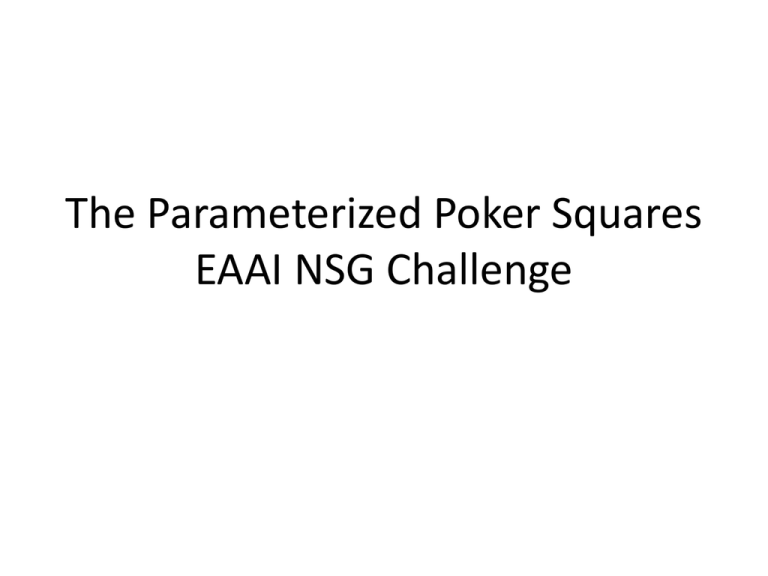
The Parameterized Poker Squares EAAI NSG Challenge What is the EAAI NSG Challenge? • Goal: a fun way to encourage good, faculty-mentored undergraduate research experiences that includes an option for peer-reviewed paper publication and presentation at a major CS conference. • Students may work independently or in teams with a faculty mentor to meet the challenge. • Challenge submissions and associated papers would be submitted at the following EAAI paper submission deadline (late-summer, one month before AAAI submission deadline). • At the next EAAI (February 2016): challenge results, accepted paper presentations, announcement of next NSG Challenge • EAAI 2016 NSG Challenge: Parameterized Poker Squares Poker Squares (Original) • Materials: – shuffled standard (French) 52-card card deck, – paper with 5-by-5 grid, and – pencil • Each turn, a player draws a card and writes the card rank and suit in an empty grid position. • After 25 turns, the grid is full and the player scores each grid row and column as a 5-card poker hand according to a given point system. American Point System Poker Hand Points Description Example Royal Flush 100 10, J, Q, K, A Straight Flush 75 A 10-J-Q-K-A sequence all of the same suit Five cards in sequence all of the same suit Four of a Kind 50 Four cards of the same rank 9, 9, 9, 9, 6 Full House 25 Three cards of one rank with two cards of another rank 7, 7, 7, 8, 8 Flush 20 Five cards all of the same suit A, 2, 3, 5, 8 Straight 15 Five cards in sequence; Aces may be high or low but not both 8, 9, 10, J, Q Three of a Kind 10 Three cards of the same rank 2, 2, 2, 5, 7 Two Pair 5 Two cards of one rank with two cards of another rank 3, 3, 4, 4, A One Pair 2 Two cards of one rank 5, 5, 9, Q, A High Card 0 None of the above 2, 3, 5, 8, Q A, 2, 3, 4, 5 Scoring Examples Let’s Play • Web: http://games.emantranet.com/PokerSquare.aspx • Other platforms: See http://tinyurl.com/pokersqrs Parameterization of Poker Squares • The American Point System (0, 2, 5, 10, 15, 20, 25, 50, 75, 100) is based on hand rank in Poker. • The British Point System (1, 3, 6, 12, 5, 10, 16, 30, 30) is based on the difficulty of forming the hands in Poker Squares. (a.k.a. English Point System) • For our challenge, AI players will be given the scoring system at play time with points in the range [-128, 127]. Examples: – Ameritish point systems: random variations on American and British systems – Single Hand: 1 point for one hand type, 0 points otherwise – Hypercorners: all 1 or -1 score values – Random: random score system in range [-128, 127] Player Interface • Java software supplied manages games, tournaments, scoring, partial scoring • The Java PokerSquaresPlayer interface is very simple: – void setPointSystem(PokerSquaresPointSystem system, long millis) – Player is given a point system and a given amount of milliseconds (300K) to form strategy from the point system – void init() – Player initializes before a game (e.g. clear board, game history) – int[] getPlay(Card card, long millisRemaining) – Given a drawn card and the number of ms remaining in the 30 second game, return the 0-based row and column the player chooses for the Card – String getName() – return the player name Structure of the Game • The game is structured as an alternating sequence of chance nodes and player choice nodes. – Each card draw is a probabilistic event where any remaining card is drawn with equal probability. – Each player action is a commitment to a card placement. chance choice chance choice Game Tree Size • How big is the Poker Squares game tree? – – – – – – – Root chance node: 52 possible cards 52 depth-1 choice nodes: 25 possible placements 52x25 depth-2 chance nodes: 51 possible cards 52x25x51 depth-3 choice nodes: 24 possible placements … 52!/27! x 25! = 52!/(27x26) 1.15x1065 nodes Although: • Different draw/play sequences can lead to the same state. • Rows/columns may be reordered without affecting score. – Still, we will not be able to evaluate entire expectimax trees except for much smaller end-game situations. Possible Approaches • Rule-based • Reinforcement Learning – Abstract each (partial) hand in play according to scoring potential – Learn expected hand score from simulated experience • Expectimax variations – E.g. Iterative-deepening, iterative-broadening • Monte Carlo Tree Search (MCTS) • ??? Evaluation • Players will be evaluated using 4 to 6 point systems. For each point system: – Players will have 5 minutes to process the point system, forming strategy, etc. – Players will then play 100 games with 30 seconds of decision time per game. – Total scores will be linearly scaled between 0 (min. total score) and 1 (max. total score). • The player with the maximum sum of scaled total scores is the winner. Supplied Code Classes • PokerSquares – manages tournaments, individual games, game sequences, etc. • Card – models playing card • PokerHand – classifies full/partial Poker hand • PokerSquaresPointSystem – generates point systems, scores hands and grids, prints grids • PokerSquaresPlayer – player interface • Sample PokerSquaresPlayer implementations What’s Next? 1. 2. 3. 4. 5. 6. Share Poker Squares with potential faculty mentors and undergraduate student researchers. Form teams and contact the contest organizer (Todd Neller) to get on the contest mailing list for updates. Download software and resources from http://tinyurl.com/ppokersqrs Enjoy creating and experimenting with your Parameterized Poker Squares players. Submit them for evaluation towards the end of the summer 2015. Optional: Write up your research results with your faculty mentor and submit your paper to EAAI one month later. – – If accepted, present your work at EAAI in February 2016. Papers will appear with EAAI papers in the AAAI proceedings. Resources and References • Organizer email: Todd Neller <tneller@gettysburg.edu> • Poker Squares Page: http://tinyurl.com/pokersqrs – References – Rules and play grids • Parameterized Poker Squares Page: http://tinyurl.com/ppokersqrs • Monte Carlo Tree Search (MCTS): – – – – C. Browne et al. A Survey of Monte Carlo Tree Search Methods L. Kocsis, C. Szepesvari. Bandit based Monte-Carlo Planning. http://www.mcts.ai/?q=mcts MCTS application to similar problem: R. Lorentz. An MCTS Program to Play EinStein Würfelt Nicht!

